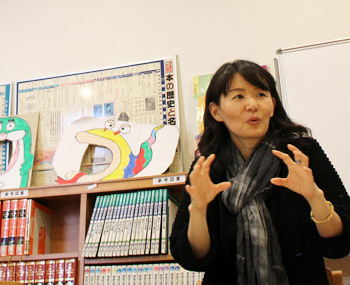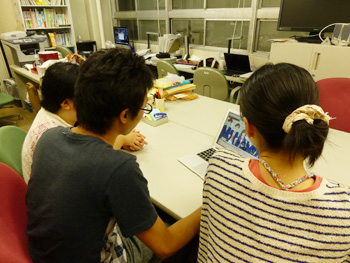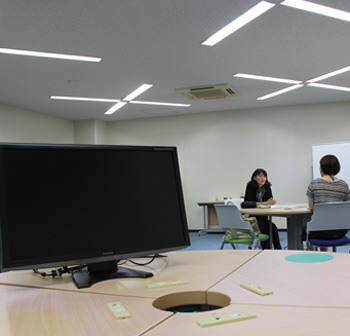TSUKUBA FUTURE
#013 Working to Prevent Bullying
Associate Professor SUZUKI Kanae, Faculty of Library, Information and Media Science

Everyone knows what it is like to have difficulty getting along with others at school or in the workplace. In school, trouble with a friend can escalate into bullying, which then becomes the normal state of affairs and in many cases will grow worse, leading to an outcome that cannot be undone. We hear about such cases through the media all of the time.
Bullying can take many forms, from light teasing to hitting or kicking, or ostracism in the classroom or via Internet-based communications. Actual bullying comes in myriad forms and degrees of severity. But in most cases what leads to bullying are miscommunication and misunderstandings between friends. When friends are unable to resolve their issues and use inappropriate actions that wind up hurting a person, compounded by pre-existing issues between individuals, the atmosphere in school, or other factors, the situation can escalate.
Prof. Suzuki and her team received a grant that began in February 2010 from the Japanese government's Funding Program for Next Generation World-Leading Researchers (NEXT Program) and has begun to develop teaching materials for preventing bullying, based on how children use the Internet today. The materials can be divided into two main categories of content: "To not bully" (prevention) and "When you see bullying around you" (handling). In terms of preventing bullying, children learn to not hurt others by "adopting an attitude of respect for each other's position and feelings" and learning "how to communicate peaceably." In terms of handling bullying, children are given actions to choose from such as seeking help for a friend in trouble, talking to a friend or adult, or approaching the bullied friend. They learn that there are many ways to deal with bullying, depending on the character of the children involved or the situation. The teaching materials provide the chance for children to think about what steps they themselves can take, also giving entire classes the opportunity to think about these things together.

Prof. Suzuki has done much research on the influence that reading has on children's development, as well as on the influence of print, video, and electronic media, and has learned that people hold strong, positive feelings toward the school library. Recently, she has received many requests to give talks on reading and children's advancement.


Graduate students trying out simulation game teaching material under development
At present, the project team is developing lesson plans in cooperation with junior high school and high school teachers for the prevention and handling of bullying. To get children interested and involved in the class, the team has been creating a simulation game as a type of teaching material. In the game, the players encounter trouble with others in the class. The players then choose an action, based on which the story unfolds. If they do nothing, or take an inappropriate action, the situation worsens. The timing of an action can affect the outcome, and the same action under different circumstances can have different effects. The important thing here is that children learn variations on the options they have—what they can do and when--and they will see the worst possible result that their action or inaction can lead to. In today's world, because the Internet is often used as a means of communication among friends, there are risks unique to the Internet that go beyond merely interpersonal issues. The project team is therefore developing materials to help children understand those risks and learn proper protocols for Net-based communication.
This series of teaching materials is almost completed, and plans are for the materials to be distributed widely at no charge. Feedback from users will be used to improve the teaching materials, and a support site will be created for teachers to share lessons plans. These efforts present a new way to work with educators and parents and guardians to tackle the problem of bullying.
Article by Science Communicator at the Office of Public Relations


